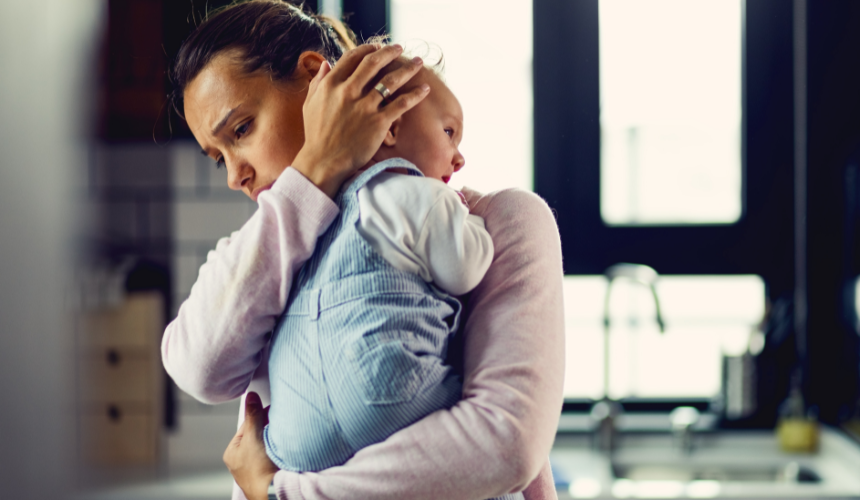
Postpartum Depression: How To Overcome?

Author: Dr Pratima Thamke MBBS, MD, MRCOG
Obstetrician & Gynaecologist at Motherhood Hospital, Mumbai
Did you know? Almost 22% of new mothers suffer from postpartum depression in India.
Like any disease, postpartum anxiety and depression too is an illness that affects some new mothers where they experience emotional highs and lows adversely impacting their day-to-day life. But the good news is that it is a curable disorder and all you need to do is opt for timely care.
As they say, prevention is better than cure. So today, let’s understand everything there is to know about postpartum recovery to ensure you are equipped for any situation.
What Is Postpartum Depression?
While having a newborn is one of the most exciting moments of one’s life, it is also life-altering. It can be extremely tiring and there are situations where new mothers feel overwhelmed, which is completely okay. It’s normal. But with postpartum depression, your emotions are extreme. From a feeling of loneliness to severe mood swings, an intense sadness washes over you.
There are some people who may ignore this and chalk it off to the anxiousness of having a child, but that’s not the case. Postpartum anxiety and depression or PPD is a type of depression, which occurs post giving birth. While there is more research needed as to why some women experience this condition, the instantaneous hormone drop can be the reason.
Instead of ignoring or neglecting this condition, the priority must be to seek proper self care after pregnancy for a healthier life. And remember, you are not at fault here and you are definitely not alone. We are right here to help you out.
Symptoms of Postpartum Depression
Feeling the blues after giving birth is quite normal and may stay for about 10 days. But it is less intense and passes away on its own. With PPD, the symptoms may last for months. Therefore, keep an eye on the signs to ensure you seek help right away.
- Frequent crying spells
- Feeling overwhelmed
- Not able to enjoy proper sleep
- Loss of appetite
- Severe mood swings
- Feeling sad or worthless
- Extreme guilt
- Unable to enjoy the activities you once loved
- No energy or motivation
- Unable to think properly or focus
- Feeling anxious around your baby
- Unable to feel interested in your baby
- Feeling like you don’t want your child
- Negative thoughts of wanting to hurt your child
Don’t hesitate to talk to your doctor right away if you are feeling any of the symptoms as they may be able to diagnose the same and offer proper treatment.

Risks of Postpartum Anxiety and Depression
A few factors may elevate the risk of PPD and they are;
- Having a history of depression
- Family history of depression
- If you are suffering from the premenstrual dysphoric disorder
- Not enjoying your pregnancy
- An unhappy relationship with your partner
- If you are someone younger than the age of 20
- If you have a baby with special needs
Diagnosis of Postpartum Anxiety and Depression
There is no specific test to check if you have postpartum anxiety and depression. However, your doctor will evaluate your mental and physical health condition where you may discuss your symptoms and other issues. Your doctor may want to see you for at least 2-3 weeks as a screening period before starting the treatment. You may also be asked to answer a set of questions as your responses will help your doctor determine the condition correctly. Therefore, you must always answer truthfully.
Treatment of Postpartum Anxiety and Depression
The treatment offered for PPD depends on the severity of the condition. Anti-anxiety or anti-depression medicines, psychotherapy, and support group participation are some of the most common treatment methods. If you are breastfeeding, you can still take medications. However, it is essential that you confirm with your doctor. It is essential to follow the treatment prescribed to ensure you get rid of your PPD as soon as possible.
When To See A Doctor ?
As aforementioned, if you notice any of the symptoms of PPD, make sure you visit your doctor. Other instances where you must seek professional help include;
- If your symptoms last more than two weeks
- You are having suicidal thoughts
- You feel like harming your baby
- You are unable to manage everyday situations
- You are feeling extremely anxious or scared
PPD or postpartum anxiety or depression is curable. Even if your symptoms are severe, with proper treatment women will notice a major difference in just six months. However, if you are having obsessive or destructive thoughts about yourself or the baby, speak with your doctor immediately. Remember, there is nothing to be ashamed of as it is a mental health disorder and doesn’t point towards the kind of person you are.
At Motherhood Hospitals, we have a team of experienced supers specialists backed by the latest infrastructure and facilities. We have the best gynaecologist in Kharghar, Mumbai. We are experts in handling complex deliveries, gynaecological, and other surgeries including a range of laparoscopic surgeries.
Do take an appointment with the best maternity hospital in Kharghar, Mumbai at a centre closest to you. Meet with our doctors who will carry out the required investigations, diagnose the issue and recommend the most appropriate treatment, enabling you to lead an active life.
If you wish to get in touch with Dr. Pratima Thamke, please book your appointment here.
FAQ’s:
- What are the essential nutrients that pregnant women need?
Essential nutrients that pregnant women need include iron, calcium, folic acid, protein, vitamin D, and omega-3 fatty acids. It is important to eat a variety of nutrient-rich foods to ensure proper nourishment during pregnancy. - How can vegetarian women ensure they are getting enough essential nutrients during pregnancy?
Generally, including lentils, beans, nuts, seeds, dairy products, and fortified cereals can help you get the essential nutrients during the pregnancy . Consult with your dietitian for expert guidance and get an individualized diet plan. - What are the best foods to eat during the first trimester of pregnancy?
Fresh fruits and vegetables, whole grains, lean protein sources like lentils and chicken, and dairy products like milk and yogurt. These foods provide essential nutrients for fetal growth and development. - What are the dietary restrictions for pregnant women?
Certain foods to avoid during pregnancy are raw or undercooked meat and eggs, unpasteurized milk and dairy products, and certain types of fish that may contain high levels of mercury. It is also important to limit caffeine intake during pregnancy. - How can a doctor help pregnant women with their diet?
Doctors can help by providing guidance on meal planning and nutrition. They can also monitor the mother's and baby's health throughout pregnancy to ensure proper nourishment and growth.
Related Blogs

How to Treat and Prevent Brown Discharge
Read More
Endometriosis Understanding, Diagnosing, and Managing the Condition
Read More
Emotional Support During IVF Treatment
Read More
Understanding Gestational Diabetes: Insights from Dr Shruthi Kalagara
Read More
Urinary Tract Infection (UTI) in Pregnancy
Read More
Early Pregnancy Care for New Pregnant Women: Expert Advice | Motherhood Hospitals
Read More
Body Positivity Tips Post C Section (Cesarean Delivery)
Read More
Vaginoplasty: Procedure, Cost, Risks & Benefits, Recovery
Read More
The Digital Dilemma: Exploring the Medical Implications of Technology on Child Development
Read More
How To Relieve Menstrual Cramps? - 8 Simple Tips
Read MoreRequest A Call Back
Leave a Comment:
View Comments
Previous
Next
HELLO,
Stay update don our latest packages, offer, news, new launches, and more. Enter your email to subscribe to our news letter


 Toll Free Number
Toll Free Number








No comment yet, add your voice below!